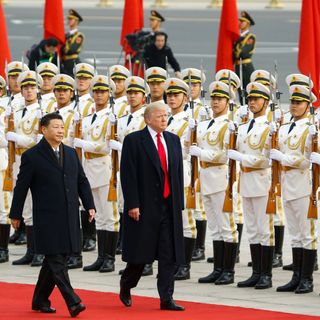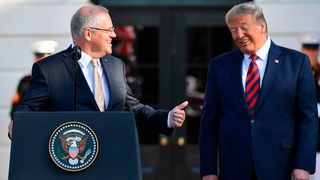In light of a slew of stories about phone calls and presidential favours, Prime Minister Scott Morrison's sheening new Trump moniker — "man of titanium" — has led some quarters to task him to prove he is not a US "lapdog".
These issues of motivations and optics, and the partisanship that accompanies them, have surged into Australia's debate about the relationship with its biggest trading partner, China.
Morrison did seem to take a step towards a key US position when he spoke in Chicago about the need for a comprehensive trade deal between China and the US and for the world's institutions to "adjust their settings for China".
But there is still more that Washington would have wanted on China from the Prime Minister's trip.
The Trump administration has made no secret its more robust approach to China, declaring a return to great power rivalry as the dominant foreign policy and security challenges confronting the United States.

Officially, Australian policy pronouncements are less direct even while several Australian government initiatives — the "Pacific Step Up", denying Huawei access to Australia's 5G rollout, foreign interference legislation and close scrutiny of Australian universities' exposure to China — have been unambiguously driven by a similar set of concerns motivating US policy.
All have been well received in the US. Nonetheless, American officials privately express frustrations that Australia has not been more assertive with Beijing.
Head-slapping dismay is not an uncommon American reaction to the manner with which the "Australia will have to choose between the United States and China" refrain is often passed for serious strategic prognostication in Australia.
American officials also worry that Australia's economic dependence compromises its ability to stand up to China.
According to new polling from the United States Studies Centre, many Australians feel the same.
Australians believe China could have the upper hand
The survey of 1,800 Americans and 1,820 Australians, fielded with YouGov in late July, found that more than two-thirds of Australians believe their country has become too economically dependent on China and only one in 10 think there should be more investment from China.
Thirty-nine per cent of Australians describe China as either "unfriendly" (29 per cent) or as "an enemy" (10 per cent): only Russia and Iran scored lower when respondents were asked to assess Australia's relationships with 14 countries.
Overall, Americans express more negative views about China than do Australians. But our analysis finds that Australians appear to have a more pessimistic view of competition between the two superpowers in the Indo-Pacific.
Overall, Americans express more negative views about China than do Australians. But our analysis finds that Australians appear to have a more pessimistic view of competition between the two superpowers in the Indo-Pacific.
A majority of Australians (53 per cent) think it is "somewhat" to "extremely likely" that the United States and China will be engaged in a military conflict within the next decade; only 36 per cent of Americans think the same.
More Australians (39 per cent) than Americans (28 per cent) report that the United States and China are already in a cold war.
Technological superiority is a powerful indicator of national power, suggesting that Australians tend to think that China has the upper hand in this new era of strategic competition.
More than half of Australians (52 per cent), but only 39 per cent of Americans, believe that China has overtaken the United States as the world's technological leader.
Australians are also much more attuned to China's Belt and Road Initiative, the program of massive Chinese infrastructure investments aimed at winning the favour of countries across the Indo-Pacific (and strategic partners in other regions).
Most Australians (51 per cent) say Australia should not participate in the Belt and Road Initiative, whereas the majority of Americans (52 per cent) had no opinion on whether the US should discourage allies like Australia from participating.
Australians are thus gloomier than Americans with respect to US-China strategic competition.
But an opposite picture tends to prevail among the political leadership of the two countries.
Political donations catalyse broader anxieties
Privately, Australian political leaders report views broadly consistent with what we see in the public opinion data.
Australian political leaders seem unwilling to take public stands.
When they do, they are accused of jeopardising Australia's economic interest or pandering to racial anxieties.
Debate in the US over the Trump administration's China policy is contained to the margins, more focused on methods than motives.
The visit to the US will have provided Australian policymakers with an opportunity to study Washington's pre-existing, bipartisan and robust legislative frameworks which help manage its relations with China.
Australian policymakers and leaders have more political capital to build the mechanisms to survey and critically assess Australia's relationship with China than they might appreciate.
Foreign influence in Australian politics is one of the key dynamics that has shaped the debate about its relationship with Beijing.
Scandals around political donations linked to foreign sources have catalysed a broader set of Australian anxieties about China.
Since the 1930s, individuals in the US who represent foreign states have been required to register as foreign agents, and for decades political donations from foreign entities have been banned at every level of US politics.
Australia only made similar moves in 2018.
Further, when the US entered into permanent normal trading relations with China in 2000, it moved to set up independent agencies and commissions to monitor aspects of the relationship and to report on them regularly to the public, Congress and the President.
Both the Congressional-Executive Commission on China and the United States-China Economic and Security Review Commission facilitate and ongoing, transparent, evidence-driven investigation of the shifting human rights, economic and strategic dimensions of the US-China relationship.
Managing important and challenging foreign relationships in this fashion has delivered a rare instance of bi-partisanship in Washington, one that has — perhaps paradoxically — strengthened under Trump's presidency.
Our analysis finds Australians alert to the sharper edges of strategic competition with China.
Australian policymakers and leaders have more political capital to build the mechanisms to survey and critically assess Australia's relationship with China than they might appreciate.







